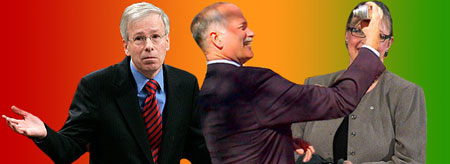About 250 federal Green party members gathered in Pictou, Nova Scotia over the weekend for a policy convention. I was not there, and have instead been trying to follow along via media reports, including these ones:
Green Party at a political crossroads [The Star]
Practising what they preach [The Chronicle Herald]
Liberals will run in all ridings, including the one where May lost; Ignatieff [CP, via Metro]
Ignatieff will run Liberal candidate against May [CTV]
Go west, young woman [Rick Anderson, The Globe and Mail]
May says Obama’s success among Canadians can help Greens in next election [CP, via Metro]
May: Greens not wilting [The Chronicle Herald]
Elizabeth May’s 2009 Convention Speech [Green Party, YouTube]
They’re working on a Green dream [The Chronicle Herald]
Greens mull Quebec ‘mystery’ [The Star]
Greens more united than ever, standing behind leadership: May [CP, via Metro]
Elizabeth May to tilt at Central Nova windmill again. [Not an Official Green Party Canada Site]
I’m glad to read that the people who attended the convention are, for the most part, feeling energized and motivated. That being said—and I mean this constructively—I do think there are a few key things that the federal Green party must do if is is to have a future beyond the next election.
Of the above links, Rick Anderson’s analysis is probably the most worth reading for anyone trying to understand where the party’s at, and where it needs to be. He points out that on the one hand, the Green party has a great set of policies that should appeal to a wide group of Canadians:
I had long thought, and still mostly do, that the Greens have a winning formula in their unique combination of practical environmentalism, fiscal responsibility and democratic reform. Those are three potent appeals, each worthy in itself, and rarely found in combination.
Arguably, all the other parties are less credible on all three of those topics than ever before.
On the other hand, he notes that what the party stands for is pretty much a mystery to most Canadians:
[The Greens have] welcome changes you could come to believe in… if you knew they were available. I don’t know about you, but I had to visit the Green website to read about [their economic stimulus plan].
Anderson is generous to blame this mostly on “the media’s preoccupation with political games and manoeuvring and tactics and day-to-day process stories” at the expense of “substantive issues of relevance to voters.” However, while that criticism of the news media is well placed, it would be foolish for Greens to get distracted by it. The Green party must earn attention and support in spite of the obstacles facing it, not use those obstacles as excuses.
The three biggest challenges as I see them are as follows (and are discussed prominently in the above articles).
First is the need for elected Green MPs. The Toronto Star reports that Elizabeth May “[admitted] that she did not view winning her riding as a priority in the last election.” She wasn’t the only one. Those of us who were advocating for a focus on electing MPs in the last general election sometimes felt like we were banging our heads against the wall. The party must realize and act on the importance of electing members under the current voting system (even while we work for change to that system). Otherwise the party’s credibility will be increasingly questioned.
Second is the widely held belief that Elizabeth advocated that Canadians vote for other parties in the last election. (I say “belief,” because Elizabeth denies that she did this. Either way, the perception is what’s important.) This needs to be repudiated in the strongest terms. There is a time and a role for partisanship, and it is the primary role of all party leaders and candidates to advocate for their party’s platform and for their own election, especially during election campaign periods. To send mixed signals to the contrary distorts election results even more than they already are distorted by our antiquated voting system.
Finally, the party must get serious about messaging and marketing. Too many Canadians still don’t know or believe that the Green party has policies on all major issues, and that those policies are often consistent not only with what various experts think (on environment, economy, crime, etc), but are also consistent with what most Canadians think and value. Ultimately only the party itself is accountable for how they’re perceived, which means that a lot of work needs to be done to communicate Green policies in compelling, inspiring, and easy to grasp ways.
In all three of these areas the party is now playing catchup. I’m not yet prepared to say it’s a lost cause as some others have, but no one should underestimate the enormity of the challenge. Before the last general election I had said privately to a few people how critical I thought an electoral breakthrough was in order for the party to maintain credibility and momentum. Since that breakthrough didn’t happen federal Greens now have to hope for a rare second chance, but it will require addressing the above three issues (among others) quickly and aggressively.
